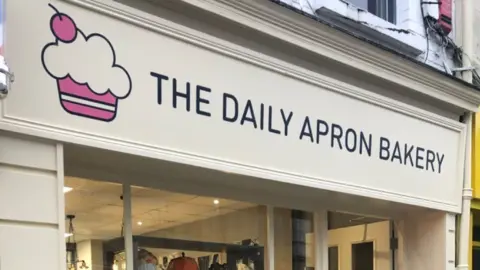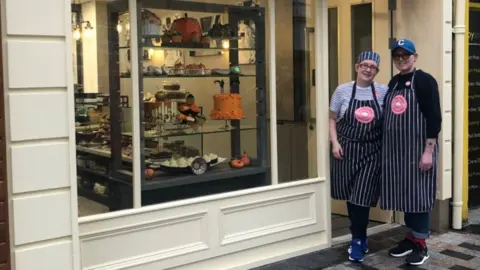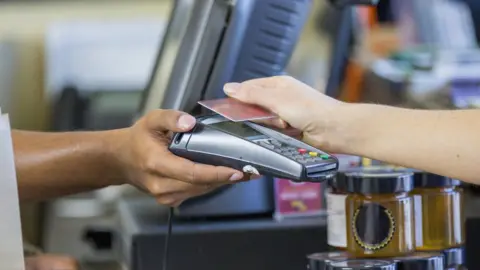Cost of living: Trade bodies outline new plan to tackle crisis
 The Daily Apron Bakery, Lisburn
The Daily Apron Bakery, LisburnA group of Northern Ireland trade organisations have published an action plan aimed at tackling the crisis in the cost of doing business.
The 15 industry bodies said a "perfect storm" was causing devastation for the retail and hospitality sectors.
Businesses are seeing a fall in trade and customers, as a knock-on effect of the cost-of-living emergency.
That, coupled with rising inflation and Covid-19 pressures, had brought businesses to a "critical juncture".
The group, which includes Retail NI, Hospitality Ulster, Northern Ireland Takeaway Association and local chambers of commerce, issued a joint statement on Monday.
They are calling for measures including a 17% reduction in VAT and for the reduced tourism/hospitality VAT rate to be reinstated for businesses that rely on household discretionary disposable income and tourism spend.
It said customers are being pushed away from local businesses as they are "having to raise prices to keep pace with rising costs".
"Out-of-control energy bill increases, labour shortages, inflation, National Insurance increases, and sky-high business rates - the highest in the UK - are risking the business climate of Northern Ireland," the trade organisations said.
"Fears that many will simply go under in the next months without government assistance are keenly felt and we cannot continue on this path of destruction any longer."
The group is also calling for urgent intervention by the UK government, along with the "limited powers of Northern Ireland Executive ministers".
Perfect storm
Speaking to BBC News NI's Good Morning Ulster programme, Katrina Collins, president of Lisburn Chamber of Commerce and co-founder of The Daily Apron café and bakery, said the cost of raw materials had rocketed.
"When you bring it down to numbers and facts it does make it very real," Dr Collins said.
"For example one of the products we use the most is butter and we've seen a 91% increase just from last year until this year.
"This time last year 20lb of butter would have been £47 and this year it is £90 - it's huge and outside of that we're looking at 15 boxes, 300lb of butter.
"Then we have things like chicken, that has gone up 63%."
 The Daily Apron Bakery
The Daily Apron Bakery Dr Collins said electricity bills had sky-rocketed, with the situation expected to get worse this winter and expressed concern that customers would be driven away.
She said business owners were striking a balance between how much of the extra cost they can pass on to customers.
"We look across the board at everything and that's done on a daily basis."

Key proposals of the plan
- Reduce VAT by 17%
- Reinstate the lower tourism/hospitality VAT rate to support businesses that rely on household discretionary disposable income and tourism spend
- Restore the business rates holiday, which ended in July 2022, until April 2023
- Reform of the business rates system to ensure online and out-of-town businesses pay the same rate as high-street businesses
- The UK government should help the devolved nations to reduce business rates by providing increased financial support through the block grants
- Remove VAT from energy bills
- The Northern Ireland Executive should establish a fund to ensure small and mid-sized towns and villages are supported during the crisis

 FatCamera/Getty Images
FatCamera/Getty ImagesAnna Doherty, interim chief executive of Londonderry Chamber of Commerce, told the same programme that the decrease in VAT rates would "immediately put money into people's pockets".
"That's what we need and we need to see a bit more consumer confidence," Ms Doherty said.
"The rising cost is affecting everyone and households are seeing their energy and food bills rising.
"That knock-on effect is causing serious problems for businesses, particularly independent traders that make up a lot of our membership here in Derry."
She said it was "vital" the Northern Ireland Assembly returns and takes action.
"It's never a good time to be without a functioning government and it's really inexcusable that householders have been abandoned in the current climate," she said.
